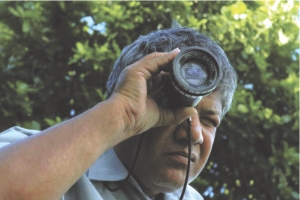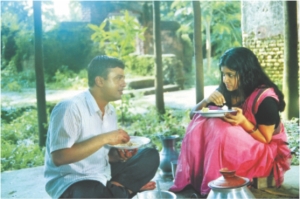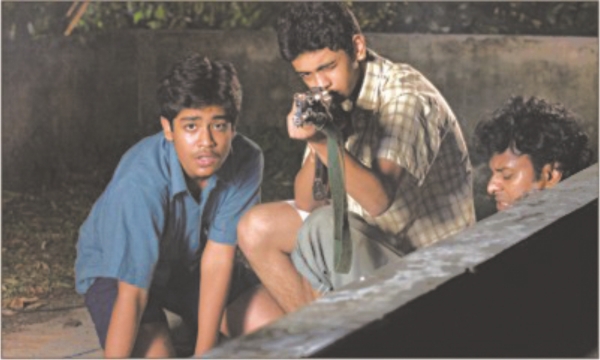| Home - Back Issues - The Team - Contact Us |
 |
| Volume 10 |Issue 46 | December 09, 2011 | |
|
|
Profile Making Memorable Moments Fayza Haq
Morshedul Islam is a soft-spoken person, self-effacing way man. Although maker of several good films of local and overseas fame, he never brags and is seldom carried away by any unnecessary observations of additions. He does not mince words, but remains a gentle, patient onlooker of events. His own life, if you were to study it, is an interesting biography— never dull, insipid or uninspiring. Drama and flash back are its integral parts. His wife Munni, a video maker herself-- with two growing children, Monnon and Medha-- helps add passion, rhythm and colour to his journey of life. Munni is a lively home-maker who takes in life as it comes. The two make an interesting symphony—with a rhapsody of its own. The children play a sensitive part in the jigsaw of their life – it being a maze as many lives are. Morshed's friends and acquaintances who have egged him on, includes Manzare Haseen Murad and Tanvir Mokammel, both successful film-makers with amazing vision, energy and determination of their own. All three have studied the art and use their knowledge and skill with amazing mastery. They have combined comedy, tragedy and pathos in their narration, with sensitivity and subtlety.
Recently, I enter Morshed and Munni's new apartment, in Dhanmandi, cheery with breeze and sunshine, and a wonderful Sisley's painting like poster of the coveted French award winning film, of 1993, "Chaka” welcom me. Over tea and toast, Morshed speaks about “Chaka”: "I saw the stage drama by Saleem Al Din, the name of which was the 'Wheel' or 'La Rou', I felt that the subject was interesting; but the drama was totally different; and this includes the dialogue. I took only the theme of the play. I rewrote the script with a theme of its own. In short, it had a different form. What attracted me was the relationship between human being and nature or life and death depends on how you see the subject. I put the question: When the carters went to the mosque, the Imam raises the question: Is the corpse that of a Muslim or Hindu? They can't answer because they don't know. ” "This question was not there in the original play,” says Islam and I added it to make the film more interesting. It adds depth to the content. The final destination of a man is that he is a human; and that which God makes goes back to God. “Caste and creed should not enter into our lives: Our vision should be all embracing. “I felt that I should tell the story in such a way that the audience would be bored. The audience goes on with the boring journey, travelling village to village, to find the identity of the corpse. I wanted, on purpose, to get the audience bored with the long journey: A relationship develops between the two carters: The two say we'll stay till we can find a place to give his body a decent resting place. By this point a relationship develops between the dead body and the audience. From that point, the pace of the film increases. I took the challenge that if the audience could watch till that portion, then they would stay on to finish the film.”
Islam says that when he made his first film "Agami” in 1982, at that time, saying anything about the Liberation War was very difficult. Creative people had to wear a muzzle, and be guarded about their comments and observations, even if that was in a subtle and veiled manner. Such were the cross currents at that time. No one was allowed to comment positively about the Liberation War at that time. He took up the challenge, and when he made that film on children, "Dipu Number Two”, he throughly enjoyed making it. The film is based on a story by Zafar Iqbal. Children of all ages take to it. Till now he has made five films for children. In this category falls “Durotto” (Alienation), which is based on a story by Humayun Ahmed. His latest film for children is “Amar Bondhu Rashed”, the story of which was also written by Zafar Iqbal.Based on the Liberation War, the plot consist of some students of class eight, who participated in the War. People took to it. The filmmaker says that making this film too gave him enormous satisfaction. Asked to go on about some of his remarkable productions, which everybody remembers, Morshedul Islam speaks of “Khelaghor” Or “Doll's House” Which has nothing to do with Ibsens's “Doll House”, incidentally. The story is based on the famous writer, Mahmudul Haque's writing. The film was made in 2006. This remains one of Islam's favourite films. Talking bout his entrée into the cine world, Islam says that he was a student of Pharmacy at the Dhaka University, when he went deep in the study of filmmaking. Before that he was involved with the theatre movement. The University theatre enthusiasts organised a Theatre Group for children called “Dhaka Little Theatre” in 1978. He was one of the founders of the theatre group. After that he was involved with the film society movement. This gave him the chance to see many classic films, from different countries. Touching on the various important films that the film-maker has presented to his audience since then, Islam says, “Actually, I'm never satisfied with any of my films, to be frank. Yet, a little bit of satisfaction was definitely there.”
Copyright
(R) thedailystar.net 2011 |
||||||


